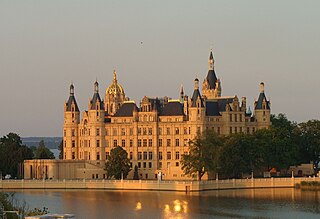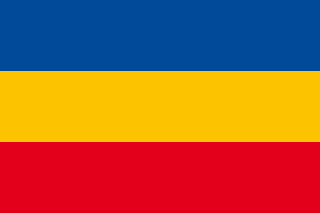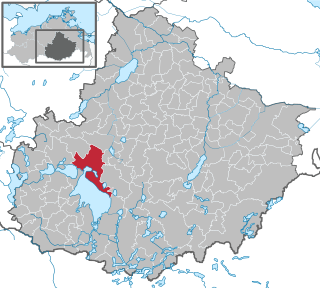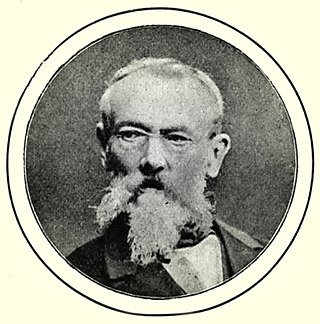
Mecklenburg is a historical region in northern Germany comprising the western and larger part of the federal-state Mecklenburg-Western Pomerania. The largest cities of the region are Rostock, Schwerin, Neubrandenburg, Wismar and Güstrow.

Mecklenburg-Vorpommern, also known by its anglicized name Mecklenburg–Western Pomerania, is a state in the north-east of Germany. Of the country's sixteen states, Mecklenburg-Vorpommern ranks 14th in population; it covers an area of 23,300 km2 (9,000 sq mi), making it the sixth largest German state in area; and it is 16th in population density. Schwerin is the state capital and Rostock is the largest city. Other major cities include Neubrandenburg, Stralsund, Greifswald, Wismar, and Güstrow. It was named after the two regions of Mecklenburg and Fore Pomerania.

Schwerin is the capital and second-largest city of the northeastern German state of Mecklenburg-Vorpommern as well as of the region of Mecklenburg, after Rostock. It has around 96,000 inhabitants, and is thus the least populous of all German state capitals.

Neustrelitz is a town in the Mecklenburgische Seenplatte district in the state of Mecklenburg-Vorpommern, Germany. It is situated on the shore of the Zierker See in the Mecklenburg Lake District. From 1738 until 1918 it was the capital of the Duchy of Mecklenburg-Strelitz. From 1994 until 2011 it was the capital of the district of Mecklenburg-Strelitz.

The Duchy of Mecklenburg-Schwerin was a duchy in northern Germany created in 1701, when Frederick William and Adolphus Frederick II divided the Duchy of Mecklenburg between Schwerin and Strelitz. Ruled by the successors of the Nikloting House of Mecklenburg, Mecklenburg-Schwerin remained a state of the Holy Roman Empire along the Baltic Sea littoral between Holstein-Glückstadt and the Duchy of Pomerania.

The Wendish Crusade was a military campaign in 1147, one of the Northern Crusades, led primarily by the Kingdom of Germany within the Holy Roman Empire and directed against the Polabian Slavs. The Wends were made up of the Slavic tribes of Abrotrites, Rani, Liutizians, Wagarians, and Pomeranians who lived east of the River Elbe in present-day northeast Germany and Poland.

Schwerin Castle is a schloss located in the city of Schwerin, the capital of Mecklenburg-Vorpommern state, Germany. It is situated on an island in the city's main lake, Lake Schwerin.

Gadebusch is a town in Mecklenburg-Western Pomerania in the district of Nordwestmecklenburg. Halfway between Lübeck, Schwerin and Wismar, it is part of the Hamburg Metropolitan Region.
Wolkwitz is a family name, or surname, of German/Yiddish/Western-Slavic origins.

Waren (Müritz) is a town and climatic spa in the state of Mecklenburg-Vorpommern, Germany. It was the capital of the former district of Müritz until the district reform of 2011. It is situated at the northern end of Lake Müritz, approximately 40 kilometres west of Neubrandenburg. Waren is home to the offices of the sub-district (Amt) of Seenlandschaft Waren, although the town itself is independent of any Amt. Its borough is the second largest in Mecklenburg-Vorpommern by area.

Lake Schwerin is a lake in Mecklenburg-Vorpommern, northern Germany. It was named after the city Schwerin, on its southwestern shore. The smaller town Bad Kleinen is on the north shore of the lake. Its surface is approximately 61.54 square kilometres (23.76 sq mi), and its maximum depth is 52.4 metres (172 ft). The natural outflow of the lake is the (channelized) river Stör, a tributary of the Elde, and part of the Elbe watershed. The Wallensteingraben, a 16th-century canal, connects the lake with the Baltic Sea at Wismar.

Niklot or Nyklot was a chief or prince of the Slavic Obotrites and an ancestor of the House of Mecklenburg. He became chief of the Obotrite confederacy, including the Kissini and the Circipani, between the years 1130 and 1131. He remained in this position until his death in 1160. At the same time he was Lord of Schwerin, Quetzin and Malchow. For nearly 30 years he resisted Saxon princes, especially Henry the Lion during the Wendish Crusade.

Lärz is a municipality in the Mecklenburgische Seenplatte district, in Mecklenburg-Vorpommern, Germany. It is governed by the Röbel-Müritz amt based in the city of Röbel.

Dorf Mecklenburg is a municipality in the Nordwestmecklenburg district, in Mecklenburg-Vorpommern, Germany. It is located 6 km south of Wismar. It is home to the castle "Mikilenburg", that gave its name to the whole region known as Mecklenburg.

Mecklenburg Castle was a medieval castle and a residential capital of the Nakonid and Nikloting dynasties of the Obotrites. It was located just south of the modern village Dorf Mecklenburg, seven kilometres south of the Bay of Wismar in Mecklenburg-Vorpommern, Germany. The only remnants of the ruined castle are parts of an earthen wall. Some scholars have associated Mecklenburg with the medieval trading emporium Reric.
Ostufer Schweriner See is a former Amt in the Ludwigslust-Parchim district, in Mecklenburg-Vorpommern, Germany. It was named after Lake Schwerin. The seat of the Amt was in Leezen. It was disbanded on 1 January 2014, when its members joined the Amt Crivitz.
Medieval Pomerania was converted from Slavic paganism to Christianity by Otto of Bamberg in 1124 and 1128, and in 1168 by Absalon.

Veste Landskron or Lanzkron is a Renaissance water castle in the municipality Neuendorf B, Vorpommern-Greifswald district, Mecklenburg-Vorpommern, Germany. Built between 1576 and 1579, it deteriorated in the 17th century. Its ruins are a tourist attraction and frequently the site of cultural events.

Friedrich Theodor Julius Schloepke was a German painter and illustrator. He worked in a wide variety of genres, including historical scenes, portraits and landscapes. Many of his paintings feature horses.


















